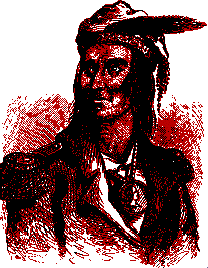Home |
Contents |
Photos |
News |
Reviews |
Store |
Forum |
ICI |
Educators |
Fans |
Contests |
Help |
FAQ |
Info


Was Native Defeat Inevitable?
(2/25/00)
 The technology and culture of Indians on America's east coast were genuine rivals to those of the English, and the eventual outcome of the rivalry was not at first clear....One can only speculate what the outcome of the rivalry would have been if the impact of European diseases on the American population had not been so devastating. If colonists had not been able to occupy lands already cleared by Indian farmers who had vanished, colonization would have proceeded much more slowly. If Indian culture had not been devastated by the physical and psychological assaults it had suffered, colonization might not have proceeded at all.
The technology and culture of Indians on America's east coast were genuine rivals to those of the English, and the eventual outcome of the rivalry was not at first clear....One can only speculate what the outcome of the rivalry would have been if the impact of European diseases on the American population had not been so devastating. If colonists had not been able to occupy lands already cleared by Indian farmers who had vanished, colonization would have proceeded much more slowly. If Indian culture had not been devastated by the physical and psychological assaults it had suffered, colonization might not have proceeded at all.
Karen Kupperman, historian, Settling with the Indians
There cannot be the slightest doubt that the Indian was crushed only by force of superior numbers. And had the tribes been united even, they might possibly have owned America today.
Ernest Thompson Seton, "Chapter II: The Spartans of the West," The Book of Woodcraft, 1912
*****
Without disease, a different story
Absent the scourge of disease, was Native defeat inevitable? I don't think so.
In the novel Aztec, Gary Jennings persuades us that the decimation of Tenochtitlán's population was a key factor in Cortés's victory. Without that, the Aztecs would've been strong enough to repel Cortés and his Mesoamerican allies. With Cortés's defeat, they would've had enough time and resources to organize the neighboring tribes to resist the encroaching Europeans.
(Cortés might have lost even if disease hadn't been a factor. For more on this view, see the Mexican version of Was Native Defeat Inevitable?)
Couldn't a few million Indians have destroyed the Europeans arriving in boatloads a few hundred at a time? We'll never know, but why not? What advantage did the Europeans have other than resistance to disease?
Technology? Sure, the Europeans had gunpowder, steel weapons, and horses, but the Indians would've quickly adopted these innovations themselves. They did in the States; after a few decades, technology was no longer a European advantage.
In fact, the natives fought the "Americans" to a standstill many times when they were even matched. Other than disease, the Europeans' primary advantage was their increasingly overwhelming numbers. And even those didn't guarantee victory.
The Indians knew the land and were fighting for their way of life. All they needed was the organization and leadership to match their will to be free. If they had achieved this before the numbers became irreversible, the natives could've cleared much of the continent of invaders.
Even without defeating the Euro-Americans outright, the Indians had many chances to co-exist peacefully. Every treaty arguably was such a chance. If the white man had only kept his word, the history of the continent would've unfolded differently.
One can see many possible turning points in US history. For instance, if Powhatan had killed John Smith without Pocahontas's intervention, depriving Jamestown of his leadership, the colony might've failed. Following on the heels of the failure at Roanoke, this might've set back efforts to colonize Virginia by 10, 20, or more years. Any delay would've given the Indians time to organize their defenses—and more important, to develop immunity to the diseases they'd been exposed to.
During the Revolutionary War, the colonists almost created a 14th state for the Indians. One bullet could've killed Andrew Jackson and prevented his unconstitutional defiance of the Supreme Court. If Custer hadn't attacked the encampment at Little Bighorn and been wiped out in turn, the US might not have insisted on finishing the Indians.
Tecumseh almost did it
The previous scenarios depended on the actions of a handful of men. Rather than relying on chance, the Indians could've taken charge of their destiny. By setting aside their differences and recognizing their common peril, they could've persented the US with a united and unassailable front.
A review of history shows this came surprisingly close to happening. In the 1780s, the Shawnee leader Tecumseh saw the need to resist. As the booklet Famous Indians explains:
Profoundly disturbed by the growing menace to Indian lands and life represented by white expansion, he worked out a great plan for his people's future. The only Indian hope, he believed, lay in uniting. He dreamed of a powerful confederation of tribes which would create a great Indian state centered around the Ohio Valley and the Great Lakes.
Tecumseh traveled the country and urged Indians from Florida to St. Louis to unite. He frequently went to Canada seeking British help. The whites were afraid he might succeed. William Henry Harrison, Governor of the Northwest Territory, wrote that Tecumseh was "one of those uncommon geniuses which spring up occasionally to produce revolutions."
So what happened? In the spring of 1811, while Tecumseh was away, Harrison sent 900 troops to confront the Indian alliance at Tippicanoe. Tecumseh's visionary brother, Tenskwatawa (called the Prophet), was in charge. As Famous Indians continues:
In disobedience of Tecumseh's explicit instructions, Tenskwatawa ordered the Indians to attack, touching off the Battle of Tippicanoe. At its end, the Indians were defeated, scattered, and disillusioned as well, for they had believed the Prophet's claim that white men's bullets would be made harmless.
Tecumseh returned to find his alliance shattered, his hopes all but destroyed.
So the Battle of Tippicanoe was a turning point in American history. If Tecumseh had been present...if Tenskwatawa had followed orders or decided not to fight...if he had been absent or sick...the battle might not have occurred and Tecumseh's alliance might've remained intact.
This was just before the War of 1812, which pitted the British against the struggling American nation. As it was, the British almost won. If they'd had a powerful Indian confederation on their side, the war might've turned out very differently.
Alternate history: Eric Flint's 1812
Cherokees take charge in 1812
1812's premise
Review of 1812
An Apache victory?
In the isolated Southwest, small bands of Apaches fought off the US Army for a decade or more. With more coordination and a commitment to guerrilla warfare, they might've done even better.
In his novel Apacheria, author Jake Page shows how this might've occurred. He presents an alternative history in which the Apaches defeated the US Army and set up their own nation.
How did it happen? Apacheria postulates the outcome if one Apache leader had lived rather than died. As the book cover puts it:
The U.S. Army believed it could easily defeat this ragtag band of savages who viewed one another more as rivals than allies. But one of those "savages" was a military genius: Juh, "He Who Sees Ahead." It was Juh's vision that persuaded the various tribal leaders to set aside their differences and work together, thus turning the disconnected bands of warring Apaches into the most cohesive fighting force the West had ever seen—and crushing the invading army.
Is the book's scenario implausible? Not at all. When the Apaches cut a single telegraph line, communications were severed and it took weeks to restore them. When the Apaches burned down a bone-dry town, the settlers became demoralized and stopped moving into the territory. The Apaches' hit-and-run tactics proved almost impossible to halt.
That shouldn't be surprising. Guerrilla campaigns are often effective. The Minutemen proved it against the Redcoats, the Vietnamese proved it against us, and the Afghans proved it against the Soviets. It's difficult for invaders to secure and build faster than the inhabitants can subvert and destroy. That's one reason I never worried about a Red Dawn-style invasion of the US. Even with gun control, the Communists (or the UN's "blue helmets," or whoever) couldn't have lasted long.
In summary, disease was the key factor in the Indians' eventual defeat. If the natives had had the numbers as well as the desire, we would've seen a lot more Little Bighorns and a lot fewer Wounded Knees. North America might be home to a mix of co-equal Native and non-Native nations rather than a few Euro-American powers and a lot of scattered reservations.
More ways Native defeat wasn't inevitable
No Jackson, no Trail of Tears
First gunshot victim in the Americas
Spanish coverup in 1536
If the Aztecs conquered Europe
If the Maori hadn't signed
Was Native defeat inevitable? (Mexican version)
Aztecs rule in Gate of Worlds
Related links
Uncivilized Indians
America the warrior society
Native vs. non-Native Americans: a summary
Readers respond
"[M]any conquered peoples fared much worse...look at WORLD HISTORY."
"It's interesting to speculate what would have happened without the Spanish intervention."
Why didn't the same thing happen in Africa as in the Americas?
"Where were their firearms, ships, wheeled cars, and metal artifacts?"
"If it wasn't for disease, Europeans would still be where they belong."
"I suspect the native cultures were in for a major change."
"In the 17th century, European technology was more advanced than any other."
Tecumseh could've "altered and checked...the westward expansion of Euroamericans."
* More opinions *
|
|
. . .
|

|
Home |
Contents |
Photos |
News |
Reviews |
Store |
Forum |
ICI |
Educators |
Fans |
Contests |
Help |
FAQ |
Info
All material © copyright its original owners, except where noted.
Original text and pictures © copyright 2007 by Robert Schmidt.
Copyrighted material is posted under the Fair Use provision of the Copyright Act,
which allows copying for nonprofit educational uses including criticism and commentary.
Comments sent to the publisher become the property of Blue Corn Comics
and may be used in other postings without permission.
 The technology and culture of Indians on America's east coast were genuine rivals to those of the English, and the eventual outcome of the rivalry was not at first clear....One can only speculate what the outcome of the rivalry would have been if the impact of European diseases on the American population had not been so devastating. If colonists had not been able to occupy lands already cleared by Indian farmers who had vanished, colonization would have proceeded much more slowly. If Indian culture had not been devastated by the physical and psychological assaults it had suffered, colonization might not have proceeded at all.
The technology and culture of Indians on America's east coast were genuine rivals to those of the English, and the eventual outcome of the rivalry was not at first clear....One can only speculate what the outcome of the rivalry would have been if the impact of European diseases on the American population had not been so devastating. If colonists had not been able to occupy lands already cleared by Indian farmers who had vanished, colonization would have proceeded much more slowly. If Indian culture had not been devastated by the physical and psychological assaults it had suffered, colonization might not have proceeded at all.